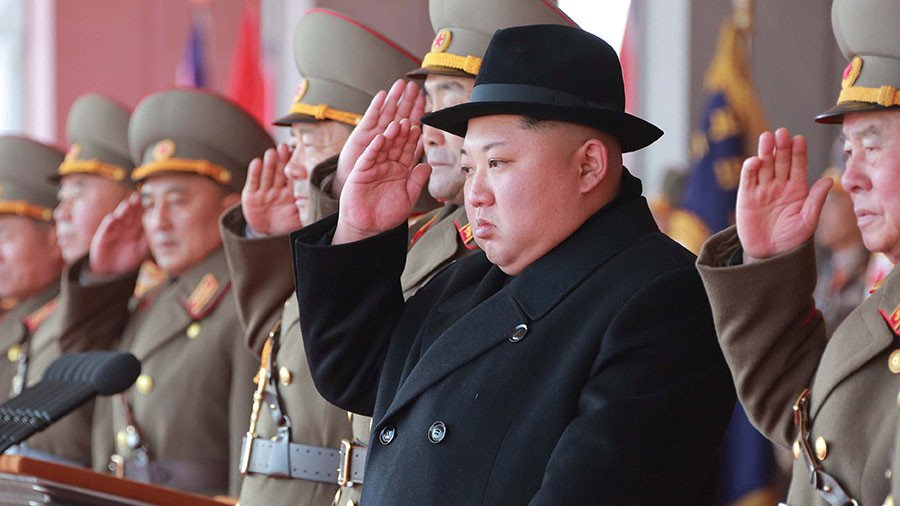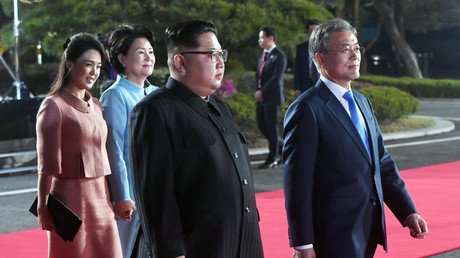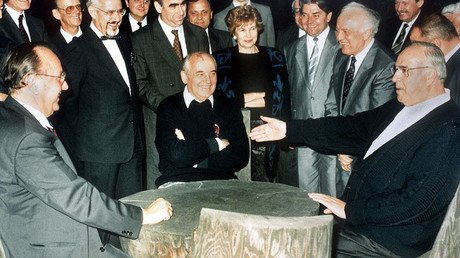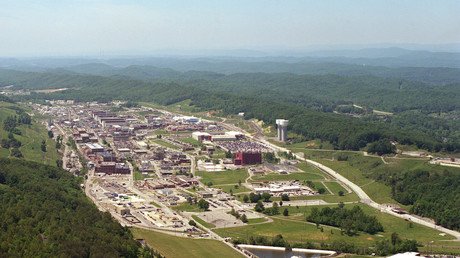Can Pyongyang trust Washington? Ask Native American Chief Red Eagle

Trump's withdrawal from the Iran nuclear agreement casts serious doubts over Washington's role in the peace process on the Korean Peninsula.
It poses the question of how Washington can possibly be trusted to keep its word when it comes to guaranteeing North Korea's security if it proceeds with denuclearization and the dismantlement of its nuclear development program. For as any serious student of US history knows, trusting Washington to keep its word is akin to trusting a crocodile not to close its jaws upon putting your head in its mouth.
With this history of mendacity and duplicity in mind, the recent photo op involving US Secretary of State Mike Pompeo and North Korean leader Kim Jong-un – shaking hands and smiling at the camera – calls to mind Shakespeare's admonition: "False face must hide what the false heart doth know."
Don't believe me? Just ask Native American Indian Chief Red Eagle.
In her landmark book on the shameful history of Indian Removals, 'The Trail of Tears,' Gloria Jahoda recounts a meeting that took place between Red Eagle and US General and future President Andrew Jackson in 1813. It occurred in the aftermath of the futile attempt by Red Eagle and his people to halt the westward expansion of white European settlers into their lands.
After a hard fought struggle against overwhelming odds in which hundreds of his warriors were killed, and desperate to save his tribe's women and children, Red Eagle arrived at Jackson's headquarters to offer himself up in surrender. According to Jahoda, despite shaking hands with his Indian counterpart and guaranteeing the safety of his people and their right to remain in peace on their own land, Andrew Jackson was convinced that "America's frontiers would always be frontiers while there were Indians to annoy the settlers. The Indians must go." Thus Jackson "silently pledged to himself to the policy of Indian Removal which in his presidency was to become law. It would be a simple law: any Indian who remained on his ancestral lands affirming his Indian identity would be a criminal."
The burning question is whether 2018 is a re-run of 1813, with US Secretary of State Mike Pompeo in the role of Andrew Jackson and Kim Jong-un a latter day Red Eagle; with the former providing assurances to the latter that neither he nor the government he represents has any intention of fulfilling?
Just how much trust can the North Koreans place in the word or an administration which at the same time it is pledging to guarantee their security in return for denuclearization, is unilaterally withdrawing from a treaty its predecessor made with Iran in conjunctions with the other five permanent members of the UN Security Council plus Germany over its nuclear development program?
History is the best teacher and never more than now, crucial for a world interested in stability and peace when it comes to understanding the nature of what it is dealing with in Washington.
Just in case anyone is under any illusions in this respect, US author William Blum in his classic book 'Rogue State,' described in the subtitle as "a guide to the world's only superpower," lays it out: "The leaders of the United States strive for world domination, for hegemony wherever possible; this had been their main occupation for over a century, it's what they do for a living."
He goes on: "The United States, NATO and the European Union form a Holy Triumvirate. The Holy Triumvirate has subsidiaries, chiefly the International Monetary Fund, World Bank, World Trade Organization, and International Criminal Court. All help to keep in line those governments lacking the Holy Triumvirate seal of approval."
Another leader with hard experience of Washington's duplicity and perfidy is Mikhail Gorbachev, hailed for his role in ending the first Cold War, though in the process unable to save the Soviet Union.
Based on declassified documents, a 2017 report by the Washington-based independent research institute, the National Security Archive, confirms that during negotiations with the Soviet government, led by Gorbachev and undertaken as part of the process of bringing the Cold War to an end, categorical assurances were given by Western governments, led by Washington, that upon the reunification of Germany there would be no attempt to expand NATO eastward towards Russia's borders.
In fact, a "cascade of assurances" was given to the Soviets, with then-US Secretary of State James Baker going as far as to pledge that NATO would expand "not one inch eastward" in a meeting with Gorbachev on February 9, 1990. It was only as a result of these assurances that the Soviet leadership was prepared to accept German reunification, given its security ramifications in a period of political turmoil.
Returning to the Trump administration's withdrawal from the Iran nuclear deal, the decision, clearly, was taken at the behest of a fundamentalist neocon foreign policy establishment in Washington in conjunction with US regional allies, Israel and Saudi Arabia. Thus the security of the American people and stability of the Middle East has been sacrificed on the altar of a hegemonic agenda that can only sound a warning in Pyongyang that Washington's objective is not peace with North Korea but the country's surrender.
Further proof is the demand issued by Trump's notorious national security adviser, John Bolton, that the North Koreans must ship all their nuclear weapons to the US in return for assurances on their security and a relaxation of US sanctions. Such a move by the North Koreans would be folly, tantamount to placing themselves at the mercy of a neocon Taliban.
Washington's role in any process of peace and reconciliation on the Korean Peninsula can, ultimately, only be an impediment to its chances of success. If it is to succeed, then Washington must be excluded, requiring that the South Koreans step forward as an independent state and refuse to accept any longer its status as a US satellite. The Trump administration's demand that Pyongyang dismantle its nuclear deterrent as a precondition for peace and reconciliation is an impertinence that should be treated with the contempt it deserves. If there is to be a precondition, it should be a joint one on the part of the North and South Korean governments, demanding the departure of US troops and military installations from the peninsula.
Whatever happens, none should forget the price paid by Red Eagle and his people for trusting the assurances of Washington: We were told that they wished merely to pass through our country… to seek for gold in the far west… Yet before the ashes of the council are cold, the Great Father is building his forts among us… His presence here is… an insult to the spirits of our ancestors. Are we then to give up their sacred graves to be allowed for corn?
Think your friends would be interested? Share this story!
The statements, views and opinions expressed in this column are solely those of the author and do not necessarily represent those of RT.



















